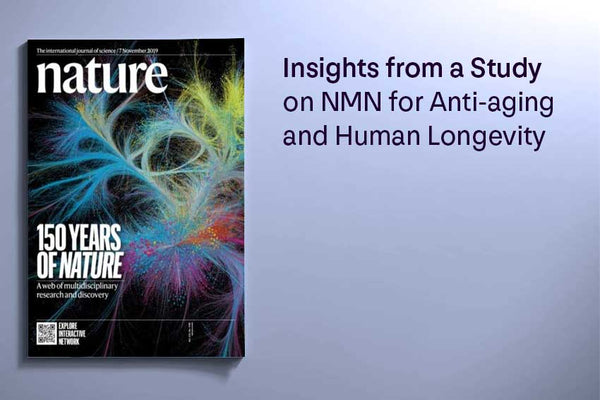
Published in the prestigious Nature journal in 2020, a groundbreaking study has significantly advanced our understanding of (NMN) as anti-aging and human longevity. Given the profound implications of aging on public health, economic sustainability, and individual welfare, this research gives us crucial insights into potential pathways and strategies to increase healthy lifespan. (The study can be found here).
Research Methodology The researchers utilized state-of-the-art technologies and experimental approaches, ranging from molecular genetics, cellular reprogramming, bioinformatics, and epidemiology. The comprehensive methodology employed in this study enhances the validity and generalizability of the results. The inclusivity of multiple scientific disciplines reflects the complex nature of aging, encompassing diverse biological systems, environmental factors, and lifestyle habits.
Principal Findings The study identified major genetic and environmental determinants of aging and longevity, underscoring the importance of a healthy lifestyle, which includes maintaining a balanced diet, regular physical activity, and social engagement. More importantly, the study revealed new understandings of the genetic perturbations that accompany aging, highlighting the potential for therapeutic interventions to slow down the aging process and potentially reverse aging.
Implications The findings break ground for the development of anti-aging drugs and lifestyle interventions. Researchers highlighted the contribution of healthy habits towards slowing down the aging process, emphasising an evidence-based approach to public health interventions to promote healthy ageing. Furthermore, the discovery of genes affecting aging could be harnessed to develop therapies that delay the onset of age-associated diseases, such as cardiovascular diseases, diabetes, and Alzheimer's disease.
Conclusion To put it briefly, this study takes strides in understanding anti-aging and human longevity. The newly discovered insights into the genetic architecture and the effects of lifestyle habits on aging, coupled with therapeutic implications, underpin the relevance of this research for societal wellbeing and public health strategy planning.
Key Takeaways
- The study presents new findings on the genetic and lifestyle factors affecting human longevity and anti-aging.
- The study suggests the potential of genetic interventions and the leading role of lifestyle changes in promoting healthy aging.
- The insights gained from this study open up opportunities for developing pharmacological and non-pharmacological interventions to delay the onset of age-associated diseases.
- The study reaffirms the multifaceted character of aging, requiring cross-disciplinary approaches and integrative understanding.
In conclusion, everyone seeks the secret to a long, healthy life. Scientists are steadily peeling back the layers of mystery that shroud our understanding of the aging process. This study serves as a milestone – a steppingstone towards the fountain of youth, the prospect of a long-lasting health span, and the dream of aging healthily and gracefully. As more research unveils the secrets of longevity and anti-aging, we will become better equipped to face the challenges that come with advancing age. The adage "prevention is better than cure" looms large in this narrative about the journey of aging well.
